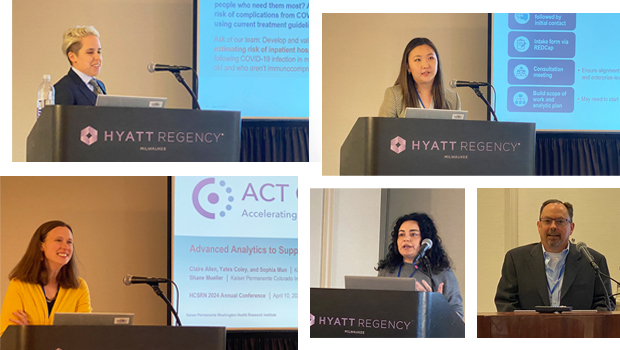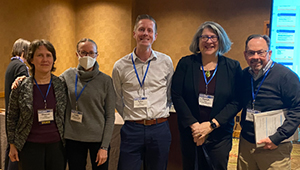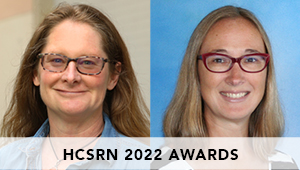KPWHRI research highlighted at 2024 HCSRN conference

KPWHRI presenters at the 2024 HCSRN conference included (clockwise from top left) Yates Coley, PhD; Sophia Mun, MPH; Roy Pardee, JD, MA; Meagan Brown, PhD, MPH; and Claire Allen, MPH (photos by Rita Mangione-Smith)
Our researchers presented on advanced analytics, social needs, and data standards
The Health Care Systems Research Network (HCSRN) spans research centers across the U.S. that are affiliated with health care organizations. Kaiser Permanente Washington Health Research Institute (KPWHRI) is a founding member, and all Kaiser Permanente regional research institutes are part of the network. HCSRN's mission includes improving individual and population health through learning health systems (LHS) research.
HCSRN researchers gathered at their annual conference in Milwaukee, Wisconsin, April 9 to 11. The conference theme was "Advancing High-Quality, Equitable Research in the Age of New Health Care Technologies."
KPWHRI Executive Director Rita Mangione-Smith, MD, MPH, said a highlight was the "strong emphasis on social determinants of health and health equity." The opening talk by David M. Kent, MD, MS, from Tufts University, set the tone, she said, by diving into questions about whether using race as a factor in predictive analytic models ultimately harms or benefits historically marginalized racial and ethnic groups.
KPWHRI presentations
Closely aligned with the theme was a panel session by KPWHRI's Claire Allen, MPH, Yates Coley, PhD, and Sophia Mun, MPH. The speakers described the advanced analytics capabilities that support the Kaiser Permanente Washington LHS Program through the Center for Accelerating Care Transformation (ACT Center).
The researchers presented practical details about collecting and analyzing data, and developing, implementing, and evaluating data-based tools such as prediction models that are integrated into clinical workflows. They emphasized making sure these and other advanced methods to improve care do not worsen health disparities. They discussed applying the information to a program at Kaiser Permanente Colorado and presented a case study of a prediction model to assist with Paxlovid prescribing to reduce COVID-19 hospitalization risk.
Coley said that audience discussions emphasized the benefits of collaborating across health systems to amplify the impact on care. "We have the rare opportunity to partner directly with our health system to have immediate impact," they said. "Our session highlighted how we can bring the rigor of comparative effectiveness research and advanced analytic methods to practical challenges faced by health systems striving to provide high-quality, equitable care."
Allen also gave a talk on career paths for the LHS workforce. Coauthors of the presentation were Erin Bowles, MPH, and Katie Coleman, MSPH. Allen said the meeting had excellent opportunities to network about key research areas at KPWHRI such as social health, implementation science, and health equity. She hopes the ability to share and learn across the HCSRN continues as the network evolves, saying, "It may be worthwhile to rethink how we can maintain productive connections in the coming years."
Meagan Brown, PhD, MPH, spoke about Kaiser Permanente’s 2022 National Social Health Survey and interviews conducted to identify the health-related social risks and needs of Kaiser Permanente members and their self-reported health. She described changes in these factors over time. Brown is now writing a peer-reviewed publication about these results.
Her KPWHRI coauthors were Rob Wellman, MS, KPWHRI contractor Kara Haugen, Carolyn Bain, Arvind Ramaprasan, MS, and Bianca DiJulio, MHS. Others were former KPWHRI researcher Cara Lewis, PhD, now at the National Institutes of Health, and Kaiser Permanente Vice President of Social Health Anand Shah, MD, MS.
Roy Pardee, JD, MA, presented "A Brief History of VDW Time," reflecting on more than 20 years of the Virtual Data Warehouse, largely led out of KPWHRI. The VDW supports collaborative data-based research by providing a standing source of standardized administrative and clinical data that is easily combined across the HCSRN.
"Over its history," Pardee said, "the VDW has gone through numerous phases of development and maturity, benefiting from multiple people's leadership and participation." Pardee described some things he hopes the VDW will have in the future, such as an HCSRN-specific index of chronic disease burden.
Looking to 2025
Next year's meeting in St. Louis, Missouri, will mark the 30th annual HCSRN conference. For the occasion, HCSRN will inaugurate a Founders Research Award, given to an outstanding HCSRN investigator.
For the rest of 2024, the HCSRN Board will continue plans to expand the network to other scientists and health care systems committed to improving health and health care through innovative, impactful research.
By Chris Tachibana
HCSRN conference

Researchers present, connect at annual conference
The HCSRN conference is a venue for collaborative work to improve health and health care.
News

Richards and Nelson earn research awards
Honors from the Health Care Systems Research Network for early career achievements and manuscript of the year
Healthy findings

HCSRN's 25th anniversary promotes enduring partnerships
Attendees of the 2019 Health Care Systems Research Network conference discussed data sharing, gender equality, new papers, and much more.


